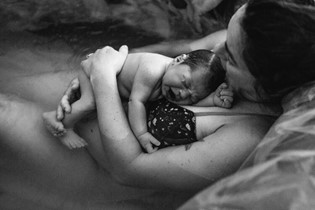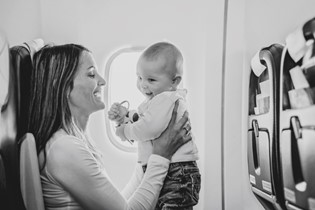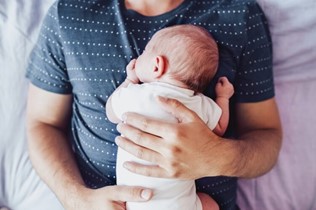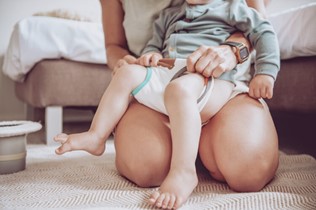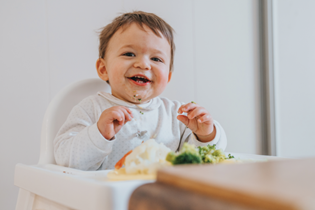Should you be drinking coffee when pregnant?

Fertility dietitian, Claudia Vavasour from Fertility Nutrition shares the latest on the effects of caffeine on you and your baby during pregnancy.
Ah coffee, just the thought of it helps to get us up in the morning, and what would life be without the simple indulgent pleasure of a row of dark chocolate in the evening and a hot morning brew to enliven us with its magical powers? They're the friends we turn to when we need a pick-me-up, making us feel energised even on the most sleep-deprived days – all thanks to their caffeine content. But should we be having caffeine in pregnancy? You may have seen this topic in the media recently, that’s because new research has been published which took a closer look at the effects of consuming caffeine in pregnancy.
FIRSTLY, WHAT IS CAFFEINE?
Well, it’s a natural chemical found in some plants or added to a variety of foods and drinks. Caffeine acts as a stimulant to our central nervous system giving us a boost of energy or an increase in alertness. Caffeine does have its perks including improvements in reaction time, reduced feelings of fatigue, improved cognitive function, and physical endurance - all great things!
But... yes, sadly there is a but, unfortunately when we are pregnant it’s best to limit our good friend, caffeine. Here’s why:
Caffeine is able to cross the placenta, reaching your baby's bloodstream. Both mother and baby breakdown caffeine slowly during pregnancy which means when mum has a high intake of caffeine, so will her baby. In fact, it can take 1.5-3.5 times longer to eliminate caffeine from a pregnant woman's body.
WHAT ARE THE OFFICIAL RECOMMENDATIONS?
The American College of Obstetricians and Gynaecologists (ACOG) recommend pregnant women limit their caffeine consumption to no more than 200mg/day. Based on the evidence, they state that in these amounts, caffeine does not appear to be linked to an increased risk of miscarriage or preterm birth, but the relationship with low birth weight is less definitive.
The Royal Australian and New Zealand College of Obstetrics and Gyneacologists (RANZCOG) currently advise that “there is insufficient evidence to confirm or refute the effectiveness of caffeine avoidance on birth weight or other pregnancy outcomes”, based on evidence published up until 2011. However, they too recommend limiting caffeine intake, and suggest no more than 300mg/day – which is the equivalent of one double shot coffee, one cup of black tea, and two squares of dark chocolate.
In a more recent systematic review and meta-analysis completed by epidemiology researchers from the University of Leeds in 2014 it was found that greater caffeine intake is associated with an increased risk of miscarriage, still birth, and low birth weight. Similar results were also found by Singaporean researchers. This is believed to be related to caffeine stimulating the increased secretion of a hormone called catecholamine. This can lead to narrowing of the blood vessels between the uterus and the placenta and can cause increased foetal heart rate leading to impaired foetal oxygenation. Studies have even found that babies born to mothers with high caffeine intake suffer similar withdrawals to adults such as headaches, tremors and sleep disturbances.
Due to the association between high caffeine intake and miscarriage, still birth, and low birth weight some countries suggest pregnant women should either limit greatly, or omit caffeine altogether. One study (a 2015 meta-analysis of observational studies) found that even low intakes (50 – 149mg/day) during pregnancy were associated with a 13% higher risk of low birth weight. However, more research is needed, as the relationship between the amount of caffeine and impact on pregnancy outcomes remains unclear. It's very possible, when you look at the totality of evidence, that there may not be a safe level of caffeine in pregnancy at all.
Our advice, as prenatal and fertility dietitians, is to limit your total caffeine intake from when you begin to try for a baby. We take a practical approach and recommend keeping total caffeine intake to below 150mg/day or give up altogether. Does this mean you need to cut out coffee, chocolate and tea completely? Absolutely not.
Rest assured, you can still enjoy a small amount of dark chocolate and a hot cup of tea from time to time. It’s just probably best to curb your morning double shot coffee ritual.
Note – not all coffee is created equal, and caffeine content can vary greatly depending on whether your coffee is instant or decaffeinated, the fineness of the grind, the beans used, and the barista. See below for a guide.
CAFFEINE CONTENT
Know the caffeine content of what you're consuming.
Here’s a breakdown of the average amount of caffeine in a number of commonly consumed foods and drinks:
+ 1 cup plunger coffee: 66mg
+ 1 cup instant coffee: 51mg
+ Cappuccino (1 shot): 105mg
+ Flat white (2 shots): 213mg
+ 250ml energy drink: 80mg
+ 330ml cola: 40mg
+ 1 cup black tea: 47mg
+ 1 cup green tea: 28mg
+ 30g (approximately five pieces) chocolate: 24mg
+ 1 cup hot chocolate: 5mg
+ 1 cup decaf coffee: 19mg

TIPS TO SAFELY REDUCE CAFFEINE CONTENT DURING PREGNANCY
+ Switch to decaf! However, be sure to choose the Swiss Water method for decaffeination. Many freeze-dried decaf coffees are actually decaffeinated using a chemical process, which is best avoided when pregnant or trying to conceive
+ When craving a hot cuppa, opt for a herbal tea such as peppermint or red bush tea which are caffeine-free
+ Choose a single shot over a double shot coffee
+ Choose sparkling water over soft drinks
+ Avoid sugary and artificially sweetened beverages and energy drinks. Instead opt for an alcohol-free, commercially-sold kombucha
+ Reduce your caffeine intake prior to pregnancy
So, to summarise: reducing caffeine intake prior to conception is important to not only help you conceive but also to reduce pregnancy related complications. Whilst current guidelines specify keeping total caffeine intakes below 200-300mg/day, there may not be a safe level of caffeine in pregnancy at all. Get familiar with how much caffeine is in your favourite foods and drinks using our helpful guide and aim to keep your total intake below 150mg/day prior to conception and ideally even less in pregnancy. Start by cutting down your caffeine intake for one month and avoid caffeine after 12pm. When feeling low in energy or reaching for a pick-me-up, use one of the tips listed. Within a few weeks you should notice you're no longer suffering withdrawals and you may find you are waking up with more energy – no longer relying on the low energy/caffeine cycle.
Claudia Vavasour is a NZ registered dietitian and leading expert in fertility and pregnancy nutrition. Her practice, Fertility Nutrition, has a team of specialised registered dietitians who are dedicated to helping women and couples improve their fertility, have healthy pregnancies and give their babies the best start in life through evidence-based nutrition. Find her at fertilitynutrition.co.nz and on social media – Facebook and Instagram.

AS FEATURED IN ISSUE 58 OF OHbaby! MAGAZINE. CHECK OUT OTHER ARTICLES IN THIS ISSUE BELOW


